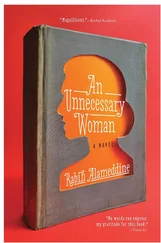The bey first met my grandfather, a waiflike, hungry thirteen-year-old hakawati, in a sleazy bar in the Zeitouneh district of Beirut before the Great War. My grandfather had been eking out a meager living by entertaining customers in between various salacious or pseudo-musical acts. The bey was inordinately charmed by the witty stories. When he inquired after my grandfather’s background, the young Ismail provided three different improbable tales in a row. On the spot, the bey hired my grandfather to be his fool, and from that point on referred to him as “al-kharrat,” the fibster, or “hal-kharrat,” that fibster. One day, feeling generous, the bey decided to give the rootless boy some dignity. Since my grandfather had no papers, no documented father, the bey called in favors, paid bribes, and offered his boy a new birth certificate, baptizing him with a fresh name, Ismail al-Kharrat.
The little hakawati arrived in our world in the early evening of January 16, 1900. Simon Twining was telling the tale of Abraham and Nimrod to a rapt audience of his wife, his two daughters, his two Armenian maids, and four Armenian orphans in his care.
“Abraham stood defiantly before his king.” The language English, the tone rising, the voice smooth. “King Nimrod grew nervous, since it was his first encounter with a free soul. ‘You are not my god,’ Abraham told Nimrod.”
Lucine felt the first pang of pain; a wave of nausea swept through her. She breathed deeply, dismissing the pain as transitory, because the baby had one more month to go. She steadied herself, felt grateful that the stool was four-legged. The doctor believed three-legged furniture to be the work of Satan. It was unstable and mocked the Trinity.
“The young man grew in stature when he defied the hunter-king Nimrod. ‘Who is this mighty God you speak of?’ asked the frightened king.” The doctor picked up the long-handled broom leaning on the corner behind him, lifted it above his head. The handle almost knocked off a small box that he had placed below the angle of a ceiling beam to catch the droppings of a pair of swallows nesting there.
Lucine’s second shot of pain arrived three fingers below her belly button, four to the right. She struggled for breath but made no sound.
“Abraham was resolute. ‘He it is who gives life and death,’ he answered, his gaze unwavering. The king said, ‘But I too give life and death. I can pardon a man sentenced to die and execute an innocent child.’ ” All the children gasped. Lucine felt flushed and dizzy. “Abraham said, ‘That is not the way of God. But can you do this? Each morning God makes the sun rise in the east. Can you make it rise in the west?’ Nimrod grew angry, had his minions build a great big fire, and ordered Abraham thrown into it. The men came to carry Abraham, but he told them he could walk.”
Just at that instant, as Abraham walked into the blazing fire, Lucine’s scream was heard throughout the valley. Water spread beneath her four-legged stool, on the scrubbed stones, collecting in the grooves that acted as miniature Roman aqueducts.
A hakawati’s timing must always be perfect.
Ah, births, births. Tell me how a man is born and I will tell you his future.
A seer had told King Nimrod that one shortly to be born would dethrone him. The king beheaded the seer as the bearer of bad tidings. He called his viziers into the throne room and commanded the death of all newborns.
What to do? Adna, pregnant with baby Abraham, left her home in Urfa without having time to pack, walked carefully across town, and headed toward a cave in one of the surrounding hills. There she gave birth. Abraham arrived with eyes open, inquisitive and watchful. The baby did not cry. Adna had no milk. The baby reached for her hand, placed two of her fingers in his mouth, and suckled. One finger supplied milk and the other honey.
And now you want to know how the hakawati was conceived, so listen.
The spring before his birth in Urfa. The sun was setting, the temperature had cooled, and the last birds were settling in the highest branches. Dr. Twining was walking home when he saw his maid, Lucine, standing on an unstable log, trying to cover the outhouse with dry palm branches, a seasonal chore: a true ceiling would trap odors, so sun-dried branches mixed with lavender and jasmine covered the top. The faux plafond protected from the elements, provided a botanical sweetness, and allowed God the choice of not looking directly at a family excreting.
The colors deepened at that time of day, allowing Dr. Twining to see his maid, with her back to him, as a mirage — ephemeral, shimmering, divine. Turkeys, chickens, rabbits, geese, three dogs, and two tortoises could all be seen moving around the perched Lucine. She was their daily feeder, and they were waiting for her. The doctor was grateful that he could provide selfless service to all the unfortunates, to the needy and the meek. A solitary swallow flew low in front of him. He saw the forked tail clearly. He fixed his gaze on Lucine, saw that she wasn’t a mirage; she moved back and forth on the unsteady log. “Lucine,” he called out. The chickens dispersed at his shout. Lucine looked back, her eyes surprised, as if they were questioning the reason for all this. She lost her balance. She opened her mouth to ask for help, swayed forward once, then stiffened, rigid as a column, and fell. Turkeys and geese scattered in all directions.
By the time he reached her, she had still not uttered a sound. She leaned against the gray wall of the outhouse, holding her bare ankle, having pulled up her skirt slightly to look at it. He bent down to examine it. “Are you all right?” he asked. “Let me see.” She removed her hand, and his took over, pressing gently. She shuddered. “That hurts?” he whispered. She nodded. His fingers pressed below the joint, gently stroked her sole. She remained quiet. “I think it’s a sprain.” His thumb and forefinger formed a gentle vise, massaging her calf. “Does this hurt?” She shook her head. Her eyes were new to him. He held her ankle with his right hand. His left massaged up farther, almost to the knee. “Does this hurt? And this? This?”
Fate, I tell you.
He consumed her right then, uncomfortably, outside the outhouse, the faint malodor acting as an aphrodisiac.
“Why would Abraham want to kill Ishmael?” I asked my mother as she undressed for the night. I, already in my pajamas, lay in bed waiting for her, trying to make my small body fit the large indentation my father had worn into the mattress.
“God asked him to sacrifice his son, but then God allowed him to substitute a sheep.” She put on her blue cotton nightgown and, in a maneuver that I always considered the height of acrobatic achievement, removed her brassiere from under the nightgown.
“Was it a boy sheep?”
“I assume so.” She finally smiled at me, chuckled, and shook her head. “Only my little Osama would wonder about that.”
She sat at her vanity to remove her makeup, which still looked wonderful. The entire family had been at Aunt Samia’s apartment to celebrate Eid al-Adha, Abraham’s sacrifice, the only holiday the Druze celebrate. I loved Eid al-Adha. Kids got money from adults during the holiday. All I had to do was walk up to any relative and smile, and I would get coins that jingled in my pockets.
“Why would God ask him to do that?”
She poured démaquillant onto a cotton ball and delicately wiped her face, sliding her hand from top to bottom. “It was a test,” she said, looking in the mirror. “He wouldn’t have let him kill his son.”
“Did he pass the test?”
“Yes, of course, dear. That’s why it’s a holiday and we get to eat so much and get fat. Two whole lambs, and nothing left. I think that’s a record.”
Читать дальше












